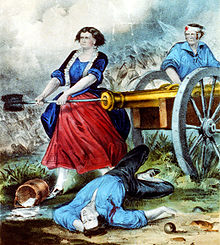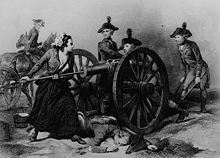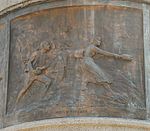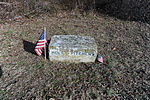- Molly Pitcher
-
Molly Pitcher was a nickname given to a woman that said to have fought in the American Revolutionary War, who is generally believed to have been Mary Ludwig Hays. Since various Molly Pitcher tales grew in the telling, many historians regard Molly Pitcher as folklore rather than history, or suggest that Molly Pitcher may be a composite image inspired by the actions of a number of real women. The name itself may have originated as a nickname given to women who carried water to men on the battlefield during the war.
Contents
Legend and evidence
The deeds in the story of Molly Pitcher are generally attributed to Mary Ludwig Hays McCauley.[1] Molly was a common nickname for women named Mary in the Revolutionary time period.[2] Biographical information about her has been gathered by descendent-historians,[3] including her cultural heritage, given name, probable year of birth, marriages, progeny, census and tax records, etc., suggesting a reasonably reliable account of her life. Nonetheless, independent review of these documents and the conclusions suggested by the family still needs to be done by professional historians; some details of her life and evidence of the story of her heroic deeds remain sparse.
Mary Ludwig was born to a German family in Pennsylvania. There is some dispute over her actual birth date. A marker in the cemetery where she is buried lists her birth date as October 13, 1744.[4] Mary had a large family including three brothers and her parents, Gretchen and John George Ludwig, owners of a dairy farm. Growing up, Mary was an active worker in the daily chores on her parents' farm. It is likely that she never attended school or learned to read, as education was not considered necessary for young girls during this time.[5]
In Bristol, Mary met William Hays, a barber, and after Willims enlistment, they were soon married. It has often been mistakenly reported that Mary's first husband was named John. However, Continental Army records show that William Hays was an artilleryman at the Battle of Monmouth in 1778.[6] (Mary's third husband was named John). On July 12, 1774, in a meeting in the Presbyterian Church in Carlisle, Dr. William Irvine organized a town boycott of British goods as a protest of the British Tea Act. A William Hays' name appears on a list of people who were charged with enforcing the boycott, howver there is no proof that it was the same William Hays.[5]
Valley Forge
In 1777, William Hays enlisted in Proctoer's 4th Pennsylvania Artillery, which later became Proctor's 4th Artillery of the Continental Army. During the winter of 1777, Mary Hays joined her husband at the Continental Army's winter camp at Valley Forge, Pennsylvania. She became a "camp follower," one of a group of soldier's wives (led by Martha Washington) who would bake and deliver food, wash clothes and blankets, and care for sick and dying soldiers.
In the spring of 1778, the Continental army was retrained under Baron von Steuben. During this time, William Hays trained as an artilleryman. Mary Hays and other "camp followers" served as "water girls" during the training, carrying water to drilling infantry troops on hot days. Also, artillery soldiers needed a constant supply of fresh water to cool down the hot cannon barrel. Artillerymen also used a "ramrod" or "rammer" -- a long pole with a wet rag tied to the end—to clean sparks and gunpowder out of the cannon barrel after each shot. A bucket of water (which had to be continuously refilled) was kept next to the cannon to allow soldiers to soak the rammer rag after every shot.
It is likely that Mary Hays earned her famous nickname, Molly Pitcher, during this time. During training, artillery and infantry soldiers would shout "Molly! Pitcher!" whenever they needed Mary to bring water.[5]
Battle of Monmouth
At the Battle of Monmouth in June 1778, Mary Hays attended to the Revolutionary soldiers by giving them water. Just before the battle started, she found a spring to serve as her water supply. Two places on the battlefield are currently marked as the "Molly Pitcher Spring." Mary Hays spent much of the early day carrying water to soldiers and artillerymen, often under heavy fire from British troops.
The weather was hot, over 100 degrees Fahrenheit. Sometime during the battle, William Hays collapsed next to his cannon. He was either wounded or collapsed from heat exhaustion. It has often been reported that Hays was killed in the battle, but it is known that he survived. [5]
As her husband was carried off the battlefield, Mary Hays took his place at the cannon. For the rest of the day, in the heat of battle, Mary continued to "swab and load" the cannon using her husband's rammer. At one point, a British musket ball or cannon ball flew between her legs and tore off the bottom of her skirt. Mary supposedly said, "Well, that could have been worse," and went back to loading the cannon.[6]
Later in the evening, the fighting was stopped due to gathering darkness. Although George Washington and his commanders expected the battle to continue the following day, the British forces retreated during the night and continued on to Sandy Hook. The battle was seen as a major victory for the Continental Army.
After the battle, General Washington asked about the woman who he had seen loading a cannon on the battlefield. In commemoration for her courage, Washington issued Mary Hays a warrant as a non commissioned officer. Afterwards, she was known as "Sergeant Molly," a nickname that she used for the rest of her life.[6]
Later life
Following the end of the war, Mary Hays and her husband William returned home to Carlisle, Pennsylvania. During this time, Mary gave birth to a son named John.[5]
In 1786, William Hays died. In 1793, Mary Hays married John McCauley, another Revolutionary War veteran and friend of William Hays. McCauley was a stone cutter for the local Carlisle prison. However, the marriage was reportedly not a happy one, as McCauley was possessed of a violent temper. Sometime between 1807 and 1810, John McCauley disappeared, and it is not known what became of him.[5]
Mary McCauley continued to live in Carlisle, Pennsylvania. She earned her living as a general servant for hire, cleaning and painting houses, washing windows, and caring for children and sick people. "Sergeant Molly," as she was known, was often seen in the streets of Carlisle wearing a striped skirt, wool stockings, and a ruffled cap.[5] She was well liked by the people of Carlisle, who said that her only flaw was that she "often cursed like a soldier." [6]
On February 21, 1822, the Commonwealth of Pennsylvania awarded Mary McCauley an annual pension of $40 for her heroism. She died January 22, 1832, in Carlisle, Pennsylvania, at the approximate age of 87.[2] She is buried in the Old Graveyard in Carlisle, under the name "Molly McCauley." A statue of "Molly Pitcher," adorned by a cannon, stands in the cemetery.
Margaret Corbin
Another probable source for the legend of "Molly Pitcher" is the true story of Margaret Corbin, which bears many similarities to the story of Mary Hays. Margaret Corbin was the wife of John Corbin of Philadelphia, also an artilleryman in the Continental army. On November 12, 1776, John Corbin was one of 2,800 American soldiers who defended Fort Washington in northern Manhattan from 9,000 attacking Hessian troops under British command. When John Corbin was killed, Margaret took his place at the cannon, and continued to fire it until she was seriously wounded in the arm. In 1779, Margaret Corbin was awarded an annual pension by the state of Pennsylvania for her heroism in battle. She was the first woman in the United States to receive a military pension. Her nickname was "Captain Molly." [5]
Commemorations
Federal
 1928 Molly Pitcher stamp.
1928 Molly Pitcher stamp.
In 1928, "Molly Pitcher" was honored with an overprint reading "MOLLY / PITCHER" on a U.S. postage stamp. In 1928, festivities were being planned to celebrate the 150th anniversary of the Battle of Monmouth. Stamp collectors petitioned the U.S. Post Office Department for a commemorative stamp to mark the anniversary. After receiving several rejections New Jersey congressman Ernest Ackerman, a stamp collector himself, enlisted the assistance of the majority leader of the House, John Q. Tilson.[7] Postmaster General Harry New stedfastly refused to issue a commemorative stamp specifically acknowledging the battle or Molly Pitcher. In a telegram to Tilson, Postmaster New explained "Finally, however, I have agreed to put a surcharged title on ten million of the regular issue Washington 2¢ stamps bearing the name 'Molly Pitcher.'"[7]
Molly was finally pictured on an imprinted stamp on a postal card issued in 1978 for the 200th anniversary of the battle.[8]
"Molly" was further honored in World War II with the naming of the Liberty ship SS Molly Pitcher, launched, and subsequently torpedoed, in 1943.
The stretch of US Route 11 between Shippensburg, Pennsylvania, and the Pennsylvania-Maryland state line is known as the Molly Pitcher Highway.
The Field Artillery and Air Defense Artillery branches of the US Army established an honorary society in Molly Pitcher's name, the Honorable Order of Molly Pitcher. Membership is ceremoniously bestowed upon wives of artillerymen during the annual Feast of St. Barbara. The Order of Molly Pitcher recognizes individuals who have voluntarily contributed in a significant way to the improvement of the Field Artillery Community.
State
The "Molly Pitcher" rest stop on the New Jersey Turnpike is named for her and is located at southbound mile 71.7.
Other
There is a hotel in Red Bank, New Jersey, not far from the site of the Battle of Monmouth, called the Molly Pitcher Inn. Close by the site, in Freehold, New Jersey, there is a small stone marker that purports to indicate the location of Molly Pitcher's well. The American Legion Post in Englishtown is named "Molly Pitcher Post 04". In the 1940s a 78 rpm record album for children dramatized the Molly Pitcher story with musical accompaniment.
There is a statue of her in Old Cemetery, Carlisle, Pennsylvania as well as a hotel named after her in the downtown area.
See also
References
- ^ Will the Real Molly Pitcher Please Stand Up!
- ^ a b "Pitcher, Molly." Encyclopædia Britannica. 13 February 2007.
- ^ http://goodyear-mascaro.org/Ludwig-Hays/Molly-Pitcher.html
- ^ http://www.findagrave.com/cgi-bin/fg.cgi?page=pv&GRid=820&PIpi=135485
- ^ a b c d e f g h Koestler-Grack, Rachel A. Molly Pitcher: Heroine of the War for Independence. Philadelphia: Chelsea House Publishers, 2006. ISBN 0-7910-8622-4.
- ^ a b c d Rockwell, Anne They Called Her Molly Pitcher. New York: Alfred A. Knopf, 2002. ISBN 0-679-89187-0.
- ^ a b Hotchner, william M. (2008-08-25). "The scandal surrounding the Molly Pitcher overprint stamp of 1928". Linn's Stamp News (Amos Press Inc.): pp. 6.
- ^ United States Postal Cards UX77, multicolored, lithographed, issued September 8, 1978, in Freehold, New Jersey. Bicentennial of the Battle of Monmouth on June 28, 1778, and to honor Molly Pitcher (Mary Ludwig Hays)
- Bohrer, Melissa Lukeman. Glory, Passion, and Principle: The Story of Eight Remarkable Women at the Core of the American Revolution. New York: Atria Books, 2003. ISBN 0-7434-5330-1.
- Raphael, Ray. Founding Myths: Stories That Hide Our Patriotic Past. New York: New Press, 2004. ISBN 1-56584-921-3. Raphael regards "Molly Pitcher" , as a myth which serves to obscure the actual (though less dramatic) contributions of women to the war effort.
- Goodyear, Robert C. The Real Pennsylvania Dutch American, "Molly Pitcher."
External links
- Find-A-Grave profile for "Molly Pitcher", identified there as Mary (Molly) Ludwig Hays (also spelled Hayes) McCauley (also spelled McCalley)
- Molly Pitcher Overprint on 2c Postage Stamp
- Tugster Blog of Molly Pitcher Rest Area on the New Jersey Turnpike
 "Molly, Captain". Appletons' Cyclopædia of American Biography. 1900.
"Molly, Captain". Appletons' Cyclopædia of American Biography. 1900.
1776 
1777 1778 1779 1780 1783 Categories:- American folklore
- Women in the American Revolution
- New Jersey in the American Revolution
- People from Carlisle, Pennsylvania
- Women in 18th-century warfare
- 1754 births
- 1832 deaths
- Tall tales
Wikimedia Foundation. 2010.




